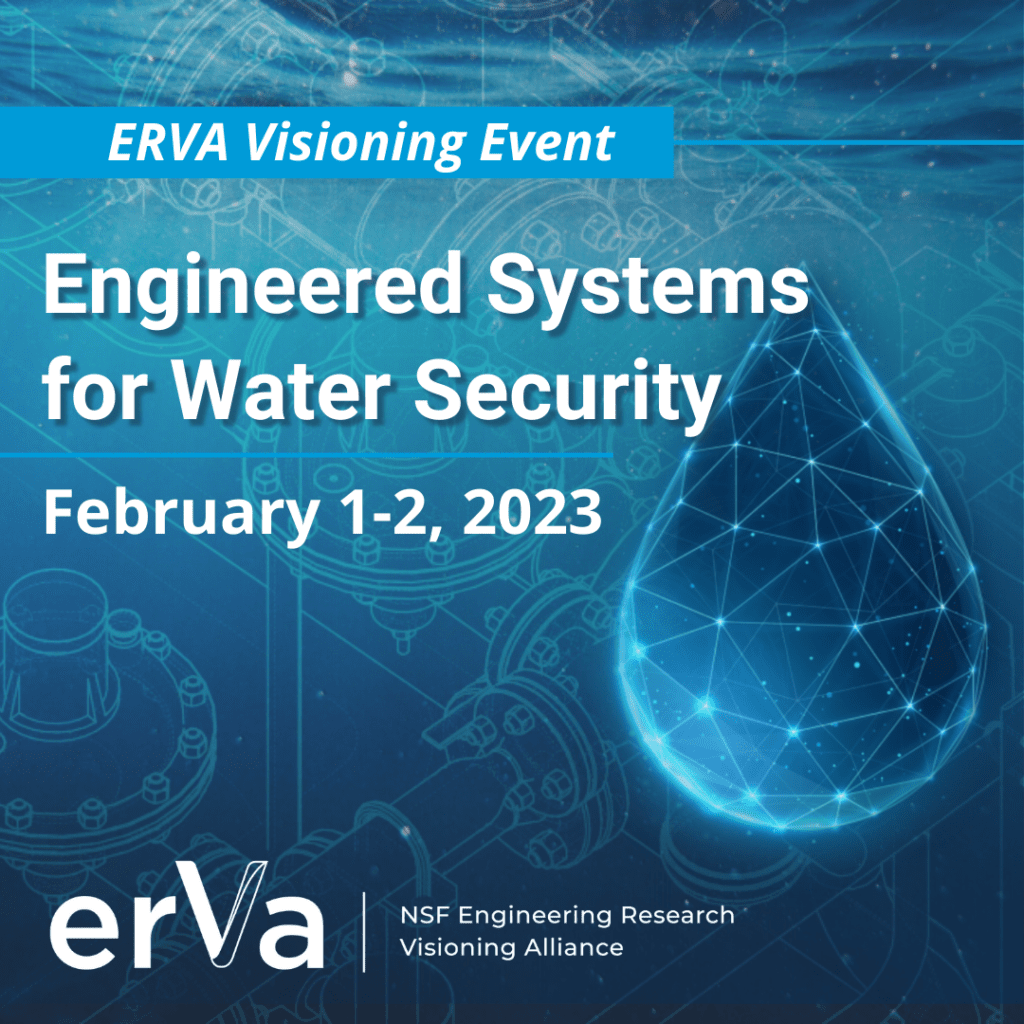More than 100 experts convened virtually over two days to prioritize bold, new engineering research directions in water security
Feb. 2, 2023 — Disastrous California flooding and contaminated municipal water system failures underscore the urgent need to transform aging, fragmented systems and create a new paradigm for water stewardship and affordable access for all. The engineering R&D required for water management and security was the backdrop for a two-day virtual visioning event convened this week by the Engineering Research Visioning Alliance (ERVA), a U.S. National Science Foundation-funded initiative.

More than 100 researchers and technical experts from academia, industry, nonprofits, and national laboratories convened to explore knowledge gaps and identify research priorities to enable technical solutions for future water management systems. Affordable access to water for people, industry, and the natural world requires a new system-of-systems approach and collaboration across different sectors, including government, industry, academia, and civil society.
New engineering R&D will be integral to the design and implementation of the technical solutions to support the integration and interoperability of different water management systems. The ERVA visioning session catalyzed creative, bold thinking and gathered future-focused research ideas from innovators and researchers in a range of specialty disciplines. Stacy Lewis Hutchinson, associate dean for research and graduate programs and professor of biological and agricultural engineering at Kansas State University, chaired the event’s thematic task force and serves on ERVA’s Standing Council and Executive Committee. The task force structured the proceedings over two days to identify specific areas of unexplored research or those at the research edge and with the potential for significant societal impact.
“The ERVA platform provided a tremendous opportunity for this outstanding group of experts to come together and discuss the security of our most valuable resource,” Hutchinson said. “Bold thinking lays the foundation for transformational engineering research that will ensure our secure water future.”
ERVA visioning events are an unparalleled opportunity for selected participants to scope engineering approaches to address societal challenges, conceptualize future solutions, and prioritize use-inspired research for long-term global impact. The participants considered issues across water use and management—from how people use and access water to industry and environmental factors.
Sustaining well-being and livelihoods, enabling economic development, and safeguarding against contamination and water-related disasters are among the goals for future water security. Planning and managing water systems for the future must include strategies that account for as yet unknown technical development that will affect people, safety, affordability, and equitable access.
“I was most impressed by the free and open exchange of ideas across a range of perspectives on water security,” said Pramod Khargonekar, ERVA co-principal investigator, distinguished professor of electrical engineering and computer science and vice chancellor for research at the University of California, Irvine. “ERVA brought together creative minds to develop exciting, compelling visions for engineering research to bring about a transformation about how we approach water security goals.”
ERVA provides the engineering community with a process for identifying bold and societally impactful engineering research directions that will place the United States in a leading position to realize a better future for all. It is an engaged, inclusive, multilayered partnership, providing a diverse array of voices with the opportunity to impact national research priorities. Event participants were identified and invited based on their research and expertise, and represent scientists across academic disciplines, geographic location, organization sector and type, gender, race/ethnicity, and career stage.
The results of the proceedings will be distilled and disseminated via a report identifying priorities for the future of engineering. The report will include high-value findings that delineate less-explored, basic, and use-inspired lines of research ripe for the engineering community to pursue.
Learn more about this visioning event and the work of the thematic task force, and sign up to receive updates and the results report.
About ERVA
The Engineering Research Visioning Alliance (ERVA) is a neutral convener that helps define future engineering research directions. Funded by the National Science Foundation (NSF) Directorate for Engineering, ERVA is a diverse, inclusive and engaged partnership that enables an array of voices to impact national research priorities. The five-year initiative convenes, catalyzes and enables the engineering community to identify nascent opportunities and priorities for engineering-led innovative, high-impact, cross-domain research that addresses national, global and societal needs. Learn more at www.ERVAcommunity.org.
Follow ERVA:
LinkedIn: https://www.linkedin.com/company/ervacommunity
Twitter: https://twitter.com/ervacommunity
Facebook: https://www.facebook.com/ERVAcommunity